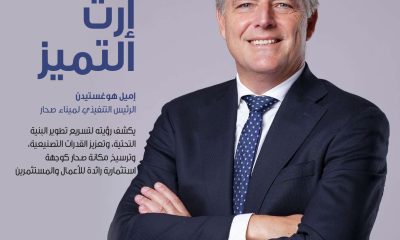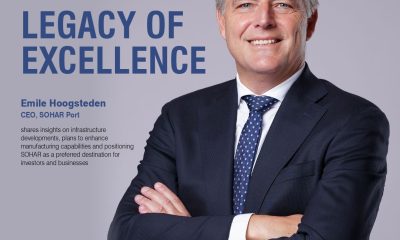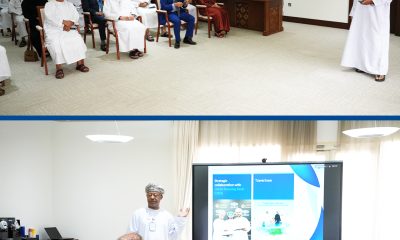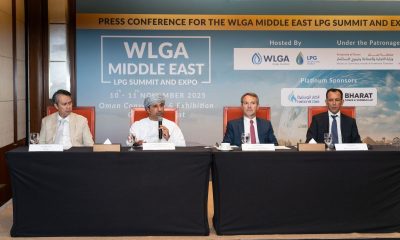Progress Oman
A nation builder
His Majesty Sultan Qaboos bin Said’s visionary leadership has been instrumental in building Oman as a developed, dynamic and progressive country since the Blessed Renaissance in 1970

 His Majesty Sultan Qaboos bin Said can rightly be described as the architect of Oman’s growth and progress, since coming to power on July 23, 1970. Over the past four and a half decades, his visionary leadership has enabled the country to blossom and develop into a modern nation, while remaining faithful to its traditions, heritage and historical identity. One of the most striking features of his leadership has been the strong relationship that has developed between the leader and his people. In all stages of the country’s long-term development strategy, top priority has been accorded to the Omani citizens, who have been regarded as the nation’s most precious resources in the drive towards achieving sustainable development.
His Majesty Sultan Qaboos bin Said can rightly be described as the architect of Oman’s growth and progress, since coming to power on July 23, 1970. Over the past four and a half decades, his visionary leadership has enabled the country to blossom and develop into a modern nation, while remaining faithful to its traditions, heritage and historical identity. One of the most striking features of his leadership has been the strong relationship that has developed between the leader and his people. In all stages of the country’s long-term development strategy, top priority has been accorded to the Omani citizens, who have been regarded as the nation’s most precious resources in the drive towards achieving sustainable development.
Formative years
His Majesty Sultan Qaboos bin Said was born in Salalah, in the Sultanate of Oman’s Southern Region, on November 18, 1940. After having received basic education in Oman, he was sent to England, in September 1958, to pursue his higher studies. In 1960, he joined the Royal Military Academy at Sandhurst, as an officer cadet. Two years later, he passed out of the Academy and joined a British infantry regiment-the lst Battalion, the Cameronians (the Scottish Rifles), which was at that time stationed in Germany – where he spent six months as a trainee in leadership skills.
On completing his military education, he returned to Britain to study local government systems and specialised courses in administration. In 1964, he returned to Oman and lived with his father in Salalah. During this time, he improved his knowledge of Islamic Sharia and the civilisation and history of his country, as well as interacted with senior Omani Sheikhs, officials, and others who visited his father.
On a blessed mission
On July 23, 1970, His Majesty Sultan Qaboos bin Said ascended to the throne beginning the era of Blessed Renaissance in Oman. At that time, Oman was one of the least developed of Arab countries and he inherited a legacy of backwardness and stagnation. From the moment he came to power, he set about implementing development projects with the aim of improving people’s standard of living. He has laid the foundations for a comprehensive national economic, social, and cultural renaissance, and has promoted Oman regionally and internationally, thus restoring the glories of its history.
He opened schools, built hospitals and roads, provided essential services, and began to expand the national economic base so that the country would not have to depend on oil as its sole source of revenue. In the years that followed, he accelerated and expanded his country’s economic, social, and political development. He established a Cabinet of Ministers to perform an executive role and run the day-to-day affairs of the government. In 1981, he expanded the Sultanate’s government and consultative base when he set up the State Consultative Council to provide for maximum participation in the country’s economic and social planning and development. In 1991, His Majesty replaced the State Consultative Council with the Majlis as-Shura, an elected assembly. In 1997, he further strengthened the country’s political institutions with the creation of a second chamber of the parliament, Majlis a’Dawla (State Council). The process of institutional development in Oman is taking place in accordance with the framework of the Basic Statute of the State, which His Majesty announced in 1996. The Basic Statute of the State is Oman’s first written constitution. In addition to setting out the framework for the political development of the Sultanate, the Statute codifies the rights and responsibilities of Omani citizens, and states the general principles on which the government of the Sultanate is to be conducted. These principles combine traditional Omani values, derived from the Islamic Sharia, with modern conceptions of human rights, political participation, and free market economics. In addition, bringing governance closer to the governed, His Majesty continues to make annual tours of the country to meet citizens face to face. In these meetings, he listens to their requests and views, addresses himself to their interests, and receives personal letters, which he reads with care before deciding on appropriate courses of action.
Applying his military experience, His Majesty has successfully modernised the country’s armed forces. He is committed to the protection of international shipping in Omani territorial waters, which include an important part of the Strait of Hormuz; this Strait is vital to the Gulf region and is the corridor through which most of the region’s oil production is shipped to the outside world.
Sustained growth
The growth rates achieved by the Sultanate are the best at the Arab level over the past half century. The strategy of the Sultanate is built on diversifying sources of national income, reducing reliance on oil as the main source of national income, and more impetus for agriculture, industry, tourism and mining sectors. His Majesty was able to establish a clear framework for stable sustained development, with careful thought, and a comprehensive approach to the goal of completing two main tracks: To establish a national spirit as the pillar for the building and development of all areas; and to open all sectors to Omani citizens so they may carry out their role as partners in drawing and orienting the process of development.
He has always stressed that the private sector is one of the cornerstones in the development, whether in its economic sense, represented in the development of trade, industry, agriculture, tourism and the economy in general or in its social sense, which is reflected in the development, training and rehabilitation of human resources.
His Majesty has always striven to allow every opportunity for maximum use of the capabilities of the Omani people at all levels and in all sectors in order fulfil the needs and requirements of the current phase of national development. In addition to his achievements in building the modern state, he has always respected Omani heritage and tradition.
Investing in people
He has had a clear, precise, and well defined vision for the future of Omani society, within its regional and international context. Considering human resources development as one of the most important pillars of nation building, he has accorded top priority to Omani citizens in Oman’s national development plans.
He has always affirmed that Omanis are highly capable of participating with their enlightened opinion and mature thought in decision making that serves their country. In order to involve them in drafting and implementing the national development programmes and ensuring them better life in all fields, he has been keen on building and integrating the institutional structure of a modern state. He has sought to have an institutional state in which the executive, parliamentary, judicial and service organisations can play their respective roles. Omani citizen is the cornerstone of the national development endeavours, as well as, the social and economic programmes through subsequent five-year plans.
The state of institutions built by His Majesty allows citizens to positively participate in the building of the nation and ensure more prosperity and progress. The examples in all fields and at all executive, parliamentary, service and local councils are countless. He attaches special care to youth and women; Omani women, who began to play a full role in Omani society from the Blessed Renaissance, now occupy important positions in the government, the private sector, social services (education and health) and in the economy as well as in the security forces.
In his speeches, he always expressed his total confidence in his countrymen and women and urged them to work diligently, inspired by consciousness of their responsibilities and duties. Addressing central issues of public concern in his speech at the opening of the Council of Oman (Majlis Oman)’s fifth term at Hisn Al Shumoukh in the wilayat of Manah in the Governorate of A’Dakhiliyah on October 31, 2011, he pointed out that the next phase in Oman’s development would be a critical one, which will demand further sacrifices from all citizens.
Referring to the expanded regulatory and legislative powers granted to the Council of Oman with its two component bodies – the State Council (Majlis as-Dawla) and the Consultation Council (Majlis as-Shura), His Majesty confirmed his intention to give top priority to the development of human resources and reiterated his belief that people are the cornerstone of any development process designed to promote human happiness, decent living standards and security. “The forthcoming stage will witness, with God’s will, even greater focus on providing more opportunities for youth to enable them to expand their knowledge,” His Majesty said. “Education is the cornerstone of progress and development, and in order to produce a responsible, aware generation endowed with expertise, skills and aspirations, towards a higher level of knowledge, a comprehensive assessment of the country’s educational progress needs to be carried out in order to ensure that those aspirations become realities and enable people to benefit from the available job opportunities in the public and private sectors,” he added.
Freedom of expression
Freedom of expression is one of the prime elements of Omani society. His Majesty reaffirmed its importance and pointed out that any obstacles to it should be removed, including the practice of forcing one’s opinions upon others, or suppressing the rights of others to express their ideas freely. “The State’s laws and regulations guarantee every Omani the right to express his opinion and to contribute constructive ideas to enhance the march of progress in the country,” he said. “We have always believed it is important there should be a wide range of different ideas and opinions, and that people should not be prohibited from thinking freely, because this is evidence of a community’s strength and its ability to benefit from these opinions and ideas to serve its aspirations for a better future and a finer, happier life. However, freedom of expression does not mean that any one party has the right to force its opinions on others or suppress the rights of others to express their ideas freely, since this has nothing to do with democracy or law; and keeping up with the times does not mean imposing ideas on other people.”
Building bridges
In world affairs, His Majesty returned Oman to the international community shortly after his accession, leading it into membership of the United Nations and other international and regional organisations. In 1981, he was one of the founders of the Arab Gulf Cooperation Council and has been a strong advocate of enhanced regional cooperation. In addition, he has ensured that the Sultanate’s foreign policy is conducted in accordance with the principles of peaceful coexistence, non-interference in the internal affairs of other countries, and cooperation and reciprocity with states whose political systems differ from Oman’s. The application of these principles has sometimes led Oman to challenge conventional views in order to give practical support to those who seek peace and reconciliation. The Sultanate’s position in support of the peace process in the Middle East reflects this distinctive approach.
His Majesty’s hope for a civilised future for all humanity and his ambitions for Oman to play a prominent role in the world form the backdrop to his concept of modern material and human development. He desired a nation which is proud of its heritage but is always ready to reach out for new horizons, as reflected in his words, “The world you have inherited is a world where fanaticism, stubbornness and law-breaking have become the norm. Violence and suppression are practised in most parts of the world and sometimes one feels driven to despair about the future of humanity. However, we believe that the day when we can defeat these wrongful practices will surely come. This is the goal which we all seek to achieve.”
Peace has been essence of the Omani policy in terms of strategy and approach since His Majesty came to throne. Adoption of such a peaceful approach is based on the fact that the construction and national development and establishment of a modern state requires the provision of essential requirements which are topped by a locally, regionally and internationally suitable climate. Peace is the center of moderate Omani policies in Gulf, regional and international forums. Thanks to the instructions of His Majesty and his deep belief in peace, the Sultanate enjoys the ability and courage not only to express with utmost clarity and openness its attitudes and point of view regarding different situations and developments in Gulf, Arab and international levels, but Oman also worked hard to put this into practice in its relations with other countries.
The Sultan Qaboos Prize for Environmental Preservation is the first Arab award awarded at the global level in the field of environmental protection. Thanks to His Majesty’s initiative and the UNESCO’s approval, this award was established in 1989. The Sultan Qaboos Prize for Environmental Preservation is awarded every two years through UNESCO’s MAB programme in recognition of outstanding contributions of individuals, groups, institutions and organisations in the field of environmental protection, in line with UNESCO’s policy and programmes in this area.
Culture and art
His Majesty also attaches great importance to culture and science in Oman. The magnificent Royal Opera House Muscat was inaugurated in October 2011. His Majesty opened the Sultan Qaboos University (SQU) Cultural Centre as part of the Sultanate’s 40th National Day celebrations and the foundation stone was laid for the Sultan Qaboos Cultural Centre in Salalah.
Academic chairs
A number of academic chairs have been established in the name of Sultan Qaboos for the study of Arab and Islamic civilisation and to promote greater mutual understanding between cultures. There are chairs at 16 of the world’s leading universities, including – among others – Harvard and Georgetown in the United States, Cambridge in the United Kingdom, Melbourne in Australia, Utrecht in the Netherlands, Beijing in China, Tokyo in Japan and Lahore in Pakistan, as well as several universities in Gulf, Arab and Islamic countries. In the field of education, an agreement was signed in March 2003 with Melbourne University for the creation of this Chair is the latest in a series of endowments to prestigious universities throughout the world. It is just one example of the Sultan’s role in promoting exchanges and mutual understanding between cultures and peoples. On December 14, 2005 at the Roosevelt Academy affiliated to Utrecht University in the Netherlands, the Dutch government resolved launching of HM Chair in recognition of His Majesty’s contributions and efforts in the field of international peace and cooperation, and development of the Sultanate as a modern state under his leadership.
Awards
Royal Decree No. 18/2011, issued on February 27, 2011, instituted the Sultan Qaboos Award for Culture, Arts and Literature and provided for the formation of its board of trustees. There are two versions of the Sultan Qaboos Award; the first of which is awarded by His Majesty for culture, arts and literature in the Sultanate and the Arab region, while the second is specific to Oman. One winner is chosen for each of the three categories, which means there are three winners annually – one cultural, one artistic and one literary. The Sultan Qaboos Award for Voluntary Work was launched to encourage and highlight the role of the voluntary sector in serving family and community. The non-government voluntary organisations are de facto partners in the Sultanate’s sustainable social development. The Award is also designed to encourage a spirit of constructive competition in serving the community and promoting co-operation and a sense of social responsibility.
-

 Alamaliktistaad Magazines2 months ago
Alamaliktistaad Magazines2 months agoAlam Al Iktisaad – September 2025 Edition
-

 Magazines2 months ago
Magazines2 months agoOER – September 2025 Issue
-

 News2 months ago
News2 months agoKitchenomiKs Secures Investment of US$3.2M Led by Jasoor Ventures
-

 News2 months ago
News2 months agoCent Capital, AI Finance App by ex-AWS Strategist ‘The Beast of Bay Area,’ Launches to End Financial Anxiety, Hits $1M AUM
-

 News2 months ago
News2 months agoOman Inaugurates ‘Hadatha’ – Its All-New Cybersecurity Center
-

 Banking & Finance2 months ago
Banking & Finance2 months agoOman Arab Bank Highlights Its Ongoing Strategic Initiatives and Future Plans
-

 News2 months ago
News2 months agoIEA Expects Global Oil Market to Remain Oversupplied in 2026
-

 Energy2 months ago
Energy2 months agoWLGA Middle East LPG Summit & Expo 2025 to be held at OCEC on November 10 and 11































You must be logged in to post a comment Login